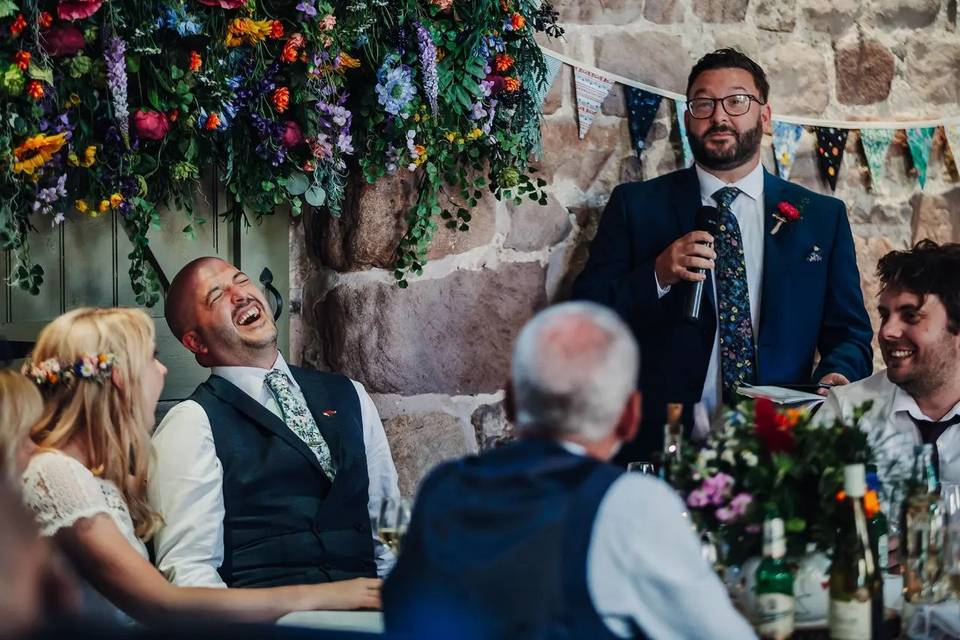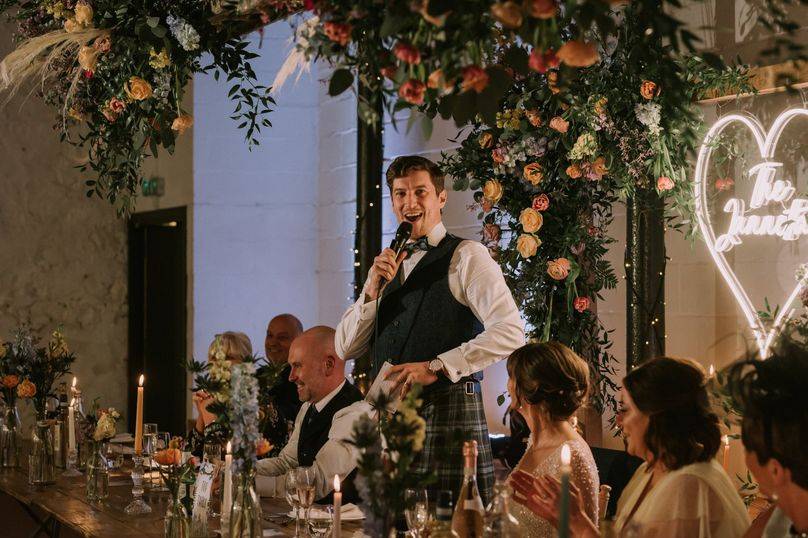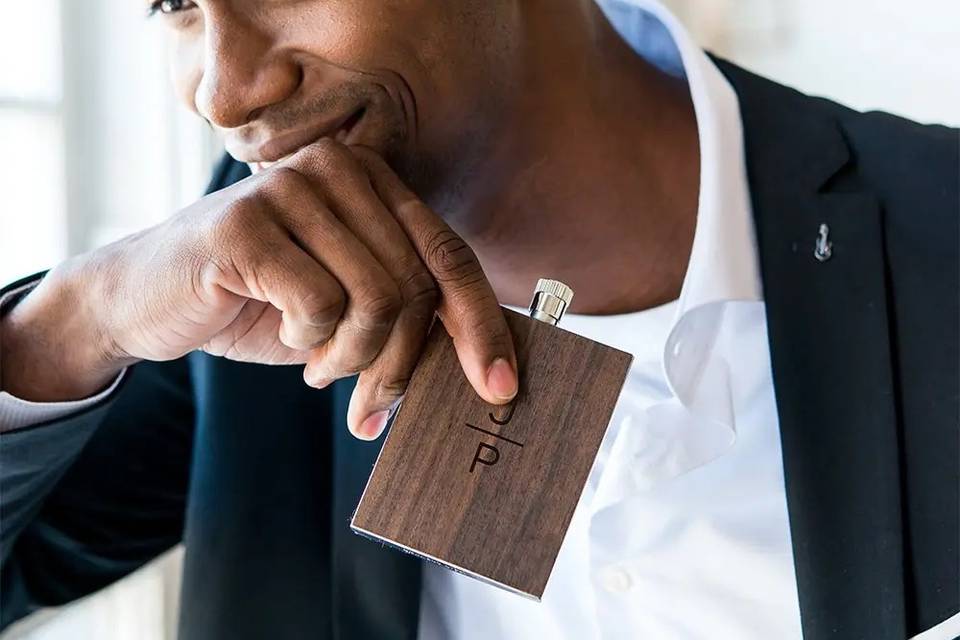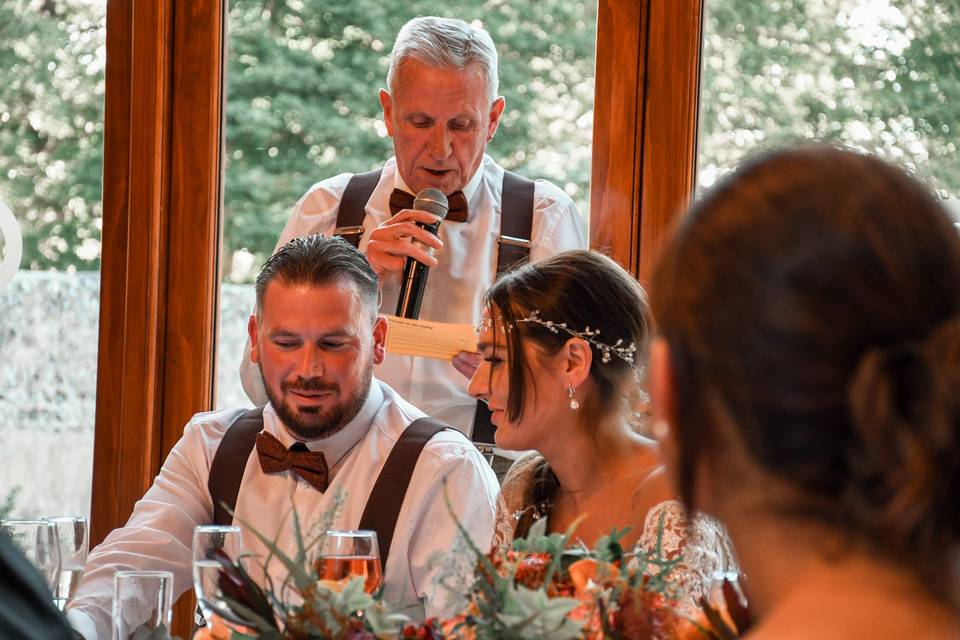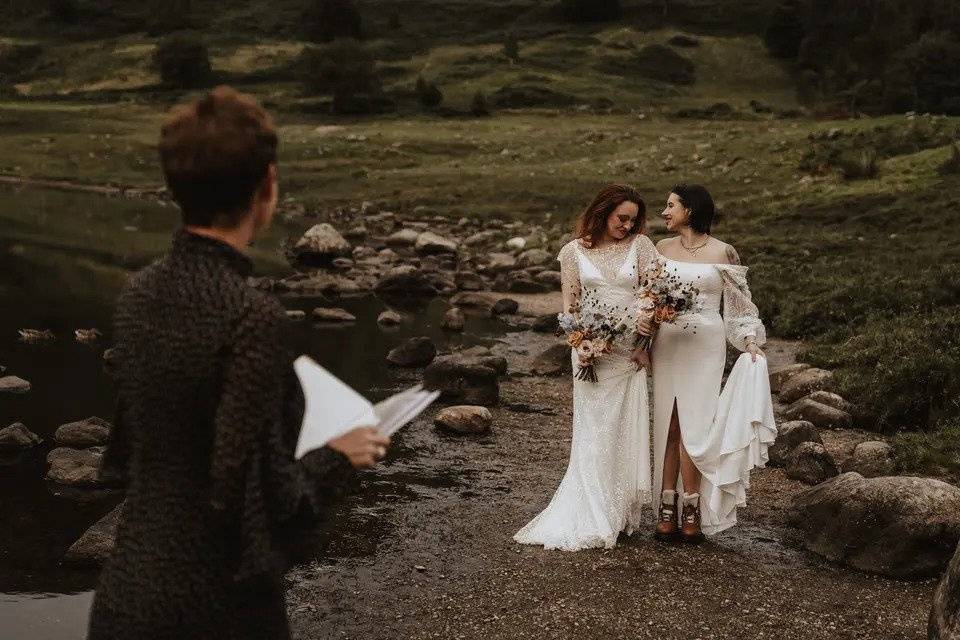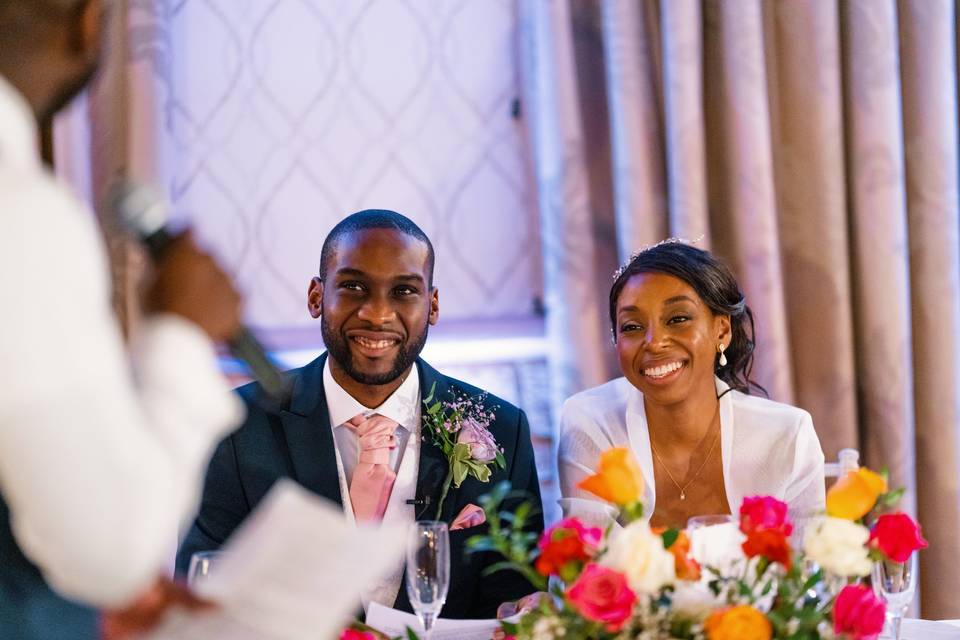12 Groom Speech Tips: How to Make a Killer Groom's Speech
Are you nervous about giving your groom's speech? Our experts have 12 top tips to giving the ultimate speech and help calm your nerves
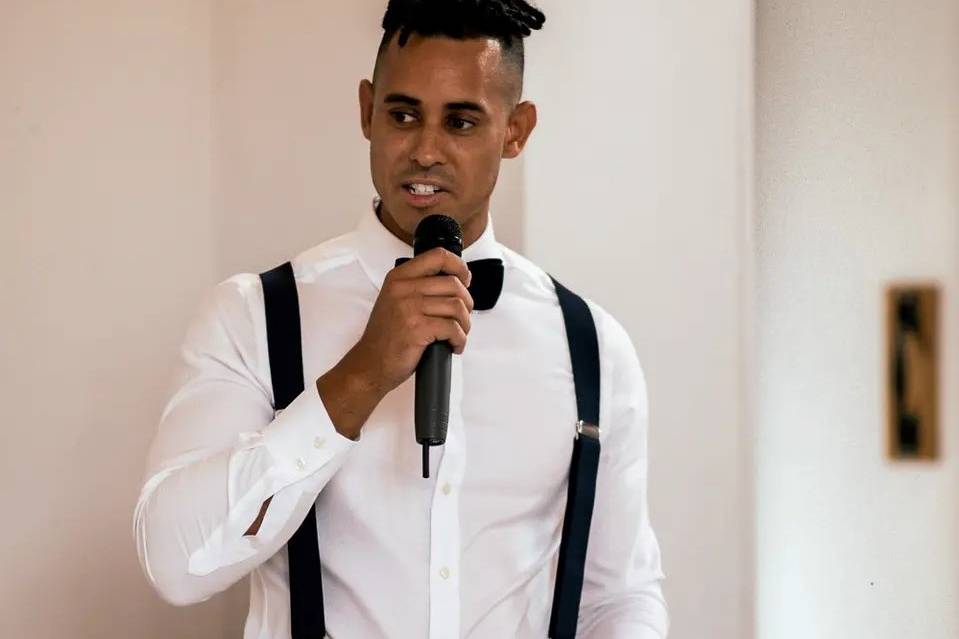
Have you been worrying about giving your groom’s speech ever since you popped the question? You’re not alone! This is arguably one of the most daunting parts of your entire wedding planning journey.
You’ll need to consider how long your speech should be, your groom speech structure, and who you should be thanking. If you’re following the traditional order of speeches, your speech will come after the father of the bride (or groom) speech, and he could have set the bar pretty high.
But, don’t fret! We spoke to wedding speech writing experts to help calm your nerves. Speechwriter Chris Dance, Adrian Simpson from All Speeches Great and Small and Heidi Ellert-McDermott from Speechy gave their best advice on what it takes to deliver a great groom speech.
- Groom's Wedding Speech Tips
- Groom Speech Preparation
- Who Does the Groom Toast and Thank?
- How to Write a Groom's Speech?
- What Does the Groom Say in His Speech?
- How Long Should the Groom's Speech be?
12 Groom's Wedding Speech Tips
So here are our top tips on giving a wedding speech, but we've also put together a handy video for wedding speech-givers in a hurry! This video explains our best wedding speech tips for grooms, in under a minute.
1. Acknowledge This Special Moment
“A great groom speech should be a really good dollop of entertainment and fun, whilst at the same time acknowledging what a very special moment this is. It’s your chance to stand up and acknowledge the people who have brought you to this point and, of course, to talk about the person you’ve been lucky enough to marry,” explained Adrian.
2. Think Carefully About How to Begin
Heidi advises that the best way to begin your groom speech is “quickly”.
She says: “Grooms often make the mistake of thinking they should sound formal and get overly stressed about following traditional etiquette. The aim is to get people laughing as soon as possible, certainly within the first three lines of your speech as it puts everyone listening at ease.”
As well as keeping it light and funny, Adrian points out that it’s important to address your partner's father and thank him for his speech: “Make it a warm and inclusive introduction, however, don’t be tempted to detail his financial contribution. A reference to his generosity should be sincere but very general.”
3. Know Your Audience
Knowing your audience applies to all speech writing and Chris emphasises this by explaining that you should: "Keep in mind who you're talking to and make the speech accessible to everyone in the room. Don't use in-jokes that only you and your workmates will get, don't risk anything offensive or controversial, and steer clear of politics."
4. Add in a Few (Appropriate) Jokes
“There’s a lot of emotion on the big day and making people laugh with some wedding jokes or amusing stories is the best way to balance that out,” explains Adrian.
Keep your stories short, funny, and appropriate! You don’t want to be embarrassing your new wife or husband on your first day as a married couple.
“Are you already concerned that your bride’s ‘pinot posse’ have started chatting up the bar staff? Or are you finding it hard to recognise your middle-aged cycling buddies in clothes that they usually wouldn’t be seen dead in? Make your humour personal and seemingly spontaneous – your guests will really appreciate it,” adds Heidi.
Adrian advises grooms to steer away from a speech that’s more of a ‘dry procession of thanks’ as you’ll struggle to keep your guests’ attention – so even if you’re not a naturally charismatic person, make sure your personality shines through above the mere thank-yous.
Take a look at these groom speech jokes for inspiration!
5. Remember to Thank Everyone
Traditionally, the groom will need to thank the following:
- Everyone for coming
- His parents
- His partner’s parents
- His best man and ushers (if there are any)
- The maid of honour and bridesmaids (if there are any)
Heidi advises that although there are probably plenty of other people who you would love to thank for their contributions and help towards your special day, try to avoid thanking half of the guest list.
A simple way to thank everyone would be to say:
"This is the best day of my life and it's because of all of you, and especially you (referring to your partner). I cannot thank you all enough for being here."
When it comes to thanking parents, there’s one thing Adrian warns grooms to be careful of. “Don’t fall into the trap of waxing lyrical about your new parents-in-law for several paragraphs, dismissing your own parents in a sentence. They should both be given equal measure.”
An example to combine them both would be to say:
"Thank you for my parents for bring me up to be the person I am today and thank you to my in-laws for welcoming me into your family."
6. Focus on Your New Partner
Heidi suggests that your new partner should be the main focus of your speech. She says, “This is a once-in-a-lifetime opportunity to drop a public love-bomb on your partner and considering they’ve just agreed to tolerate all of your habits and box sets for the rest of their life, it’s the least you can do!
“Remember, every groom thinks his partner is gorgeous, kind and generally amazing so avoid cliché terms and words and concentrate on what makes them unique. Nailing their individual and quirky characteristics shows that you really get your new husband or wife and your friends and family will love you for that.”
Chris recommends that you do this by giving examples: "Don't just say that your partner is kind and thoughtful; illustrate it with the story about the time that they dressed up as Boba Fett and threw you a surprise Star Wars party, or about how they still hold your hand at the dentists because you hate the sound of the drill."
7. Forget Giving Out Gifts
Heidi advises that if you’re planning on giving thank you gifts to bridesmaids, parents or anyone else, either do it earlier on in the day or announce that you’ll be personally thanking them later as to not disrupt the speech.
She says: “Gift-giving is basically an excuse for guests to start checking their WhatsApp!”
8. Don't Be Too Ambitious
The time you take to the mic to make your groom's speech will no doubt be a big moment, but Chris shares that it is important to be realistic about what your comfort zone is and stay in it.
"It's a speech to your friends, not an audition for Britain's Got Talent. If you're terrified of public speaking, keep it simple. Don't give yourself unnecessary stress by filling your speech with tongue-twisters or trying to be Billy Connolly."
9. Think Carefully About the Structure
Adrian says, “There are lots of people to talk about and you should deal with them one at a time and avoid repetition.
“Resist the urge to launch straight into how amazing your new partner looks and then pepper the speech with references to them. They are the star of the show so save the latter half of the speech to be dedicated to them and what they mean to you.”
10. Eight Minutes is the Perfect Length of Time
Adrian says that the length of a groom’s speech can really make or break it: “Too short and people are going to be wondering why you bothered. Too long and nobody will be listening. Keep it to a ‘stand up-sit down’ time of 10 minutes – that’s a talking time of around eight minutes and the rest will be made up from laughter, applause and heckles.”
Heidi also stressed the importance of not boring people with a lengthy speech, but also not coming across like you’re enjoying the attention a little too much.
11. Avoid Too Much Detail
Adrian explained that it’s too much detail that really slows a speech down: “A great speech demands the very least from the guests in order for them to enjoy it, so now is not the time to recount exactly how you know each of the ushers individually. A good guide is to aim for a total of 1,350 words – if you’re edging well over that, then it’s time to strip out some of the content.”
12. Think About Your Ending
According to Adrian: “Tradition says that you should end on a toast to the bridesmaids and a little aside to the best man. I’ve never found this works – in my opinion, the focus of the speech should be exclusively on your partner, that’s why I suggest toasting to the bridesmaids earlier in the speech and making the final words all about your partner.
“You should have talked about the best man earlier in the speech but there’s no harm in having a quick one-liner referencing him at the end but make sure it’s after the final toast.”
Groom Speech Preparation To Calm Your Nerves
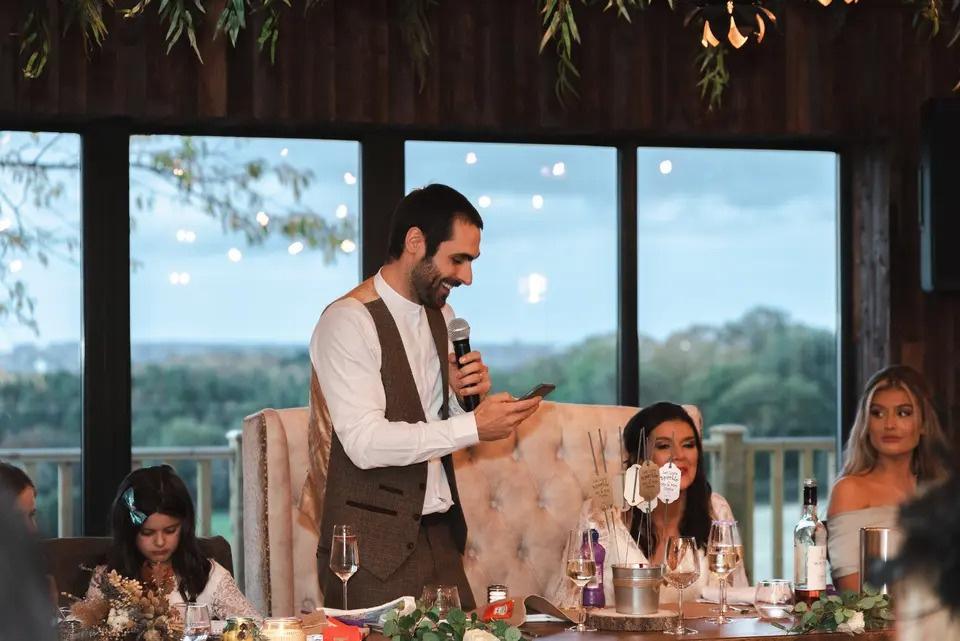
Heidi has a lot of advice when it comes to calming nerves around your wedding speech, starting with just how important the planning and preparation is.
“The key to being confident on the day is writing a wedding speech that’s so good you can’t wait to deliver it. If you know you’re going to make your friends laugh, your mum cry and your bride/groom love you even more then you’ll ooze confidence whilst delivering your speech.”
1. Film Yourself – Use your phone to film yourself practising your speech. Watch it back and channel your inner Simon Cowell – work out how your delivery could be improved and what you would change.
2. Dutch Courage Isn’t Always the Answer – Although lots of grooms swear by a bit of Dutch courage, this is based on wishful thinking rather than solid science!
3. Smile and Breathe – It may sound obvious but taking a deep breath is surprisingly effective at reducing those stress nerves and smiling is scientifically proven to be infectious, making them a fool-proof combination.
Does the Groom Give a Speech?
Traditionally, the groom will give a speech at the wedding reception, following the ceremony. You can do whatever works for you, but the traditional order for speeches is for the father of the bride to speak, then the groom, best man and any other toasts.
How to Write a Groom's Speech
If you are writing your groom's speech yourself the key points to remember are to compliment your new spouse and thank any key guests. Any other additions are nice extras!
Writing not your strength? Hiring a professional speechwriter is a brilliant option. "It’s not cheating - if it is then so is ordering a wedding cake when you’ve got perfectly good eggs and flour at home," shares Chris.
"Speech writing is a specialist skill: giving the task to someone who can mould your words and articulate your thoughts is as valid a use of your budget as any other wedding service you’re paying for – arguably more valid, given that it’s probably the bit of the day you’re most worried about."
What Does the Groom Say in His Speech?
"The groom should focus on thankyous," explains Chris. "He should thank everyone for coming to the wedding - especially Jim and Tania who’ve kayaked all the way from Gdansk; anyone who contributed to it significantly, his partner’s parents for spawning such a catch; his own parents for loving and/or tolerating him.
"When he’s done that he can get on with lavishing praise on the person he’s married and saying how deliriously happy he is. That’s what the guests really want to hear from him, so he needs to do that bit well and sincerely."
How Long Should a Groom's Speech be?
Ideally, you want your groom's speech to be no more than ten minutes. Make sure to rehearse it a few times before the big day and time yourself - you don't want your guests to start getting bored!
"Just remember, if there are two or three other speakers then you’re asking your guests to sit still and listen patiently for half an hour, which is a long time when you’re stuffed full of wine, sea bass and tiramisu and you want to stretch your legs.
"However long your speech lasts (I find seven to ten minutes is usually enough), try to keep it punchy, lively and relevant: there is such a thing as a five minute speech that’s so dull it feels like a lifetime, yet fifteen minutes can race by if your speech is bright, engaging and funny," says Chris.
Still feeling nervous? Fear not – here’s our guide on how to deliver an amazing wedding speech!

